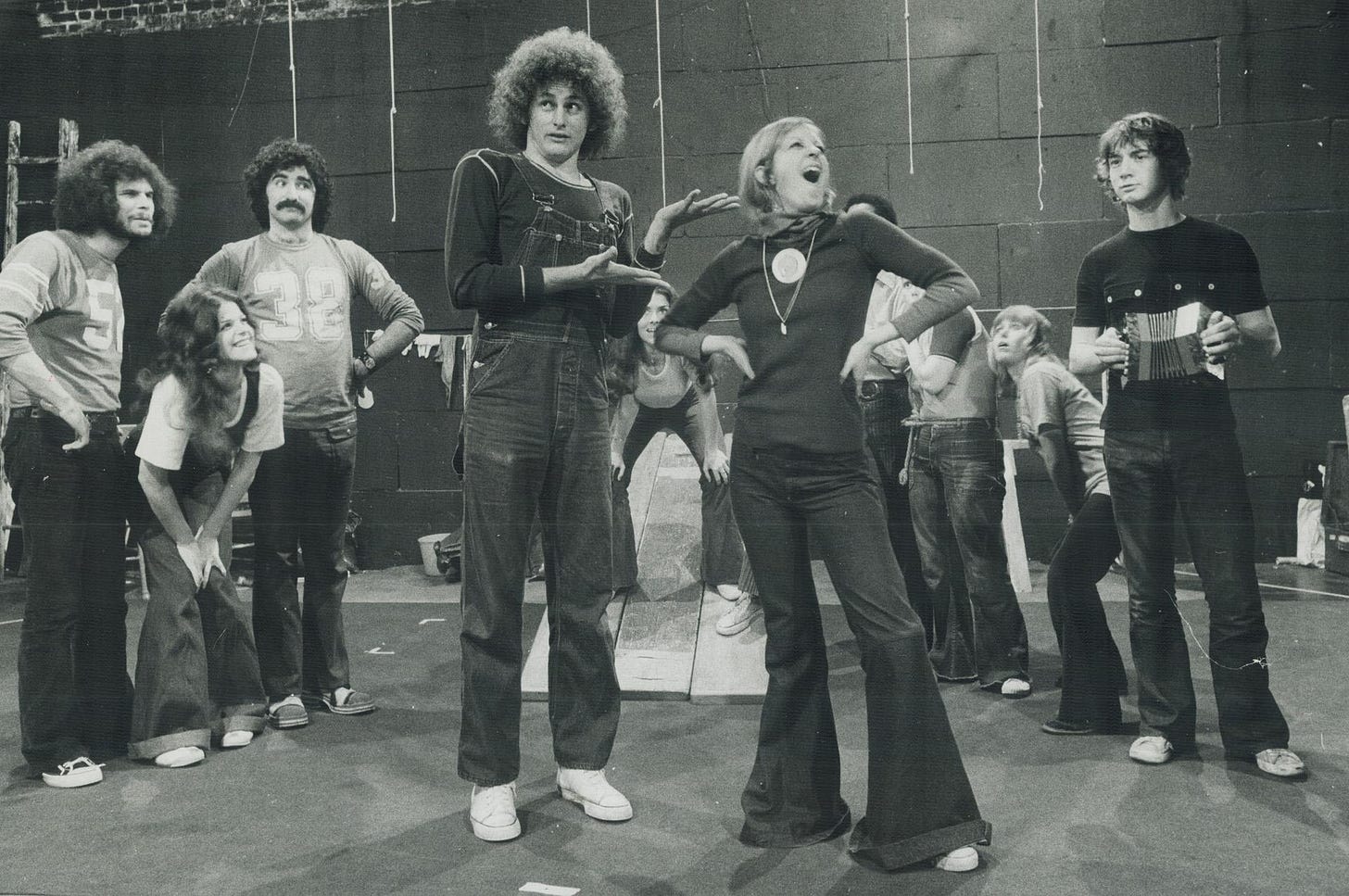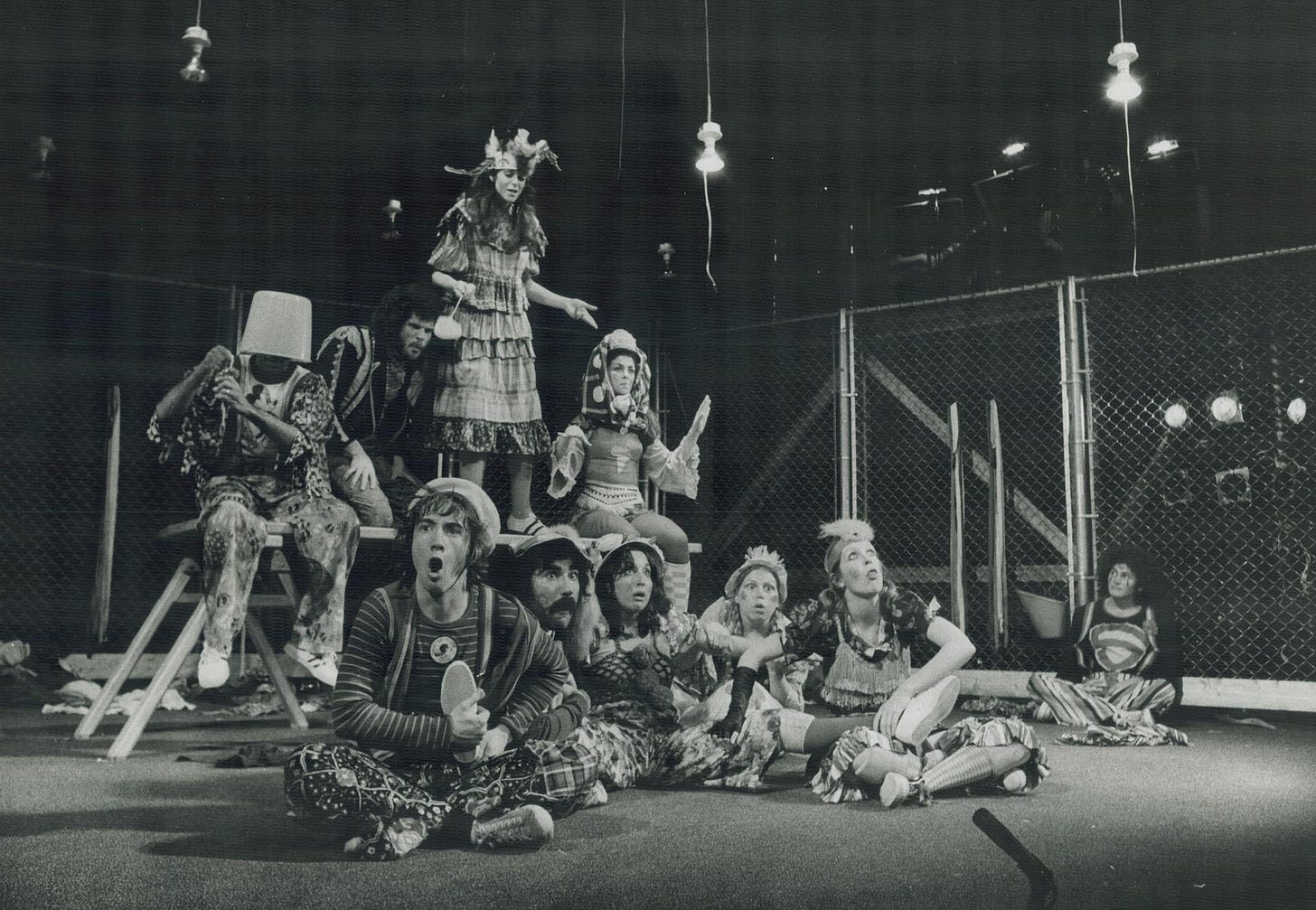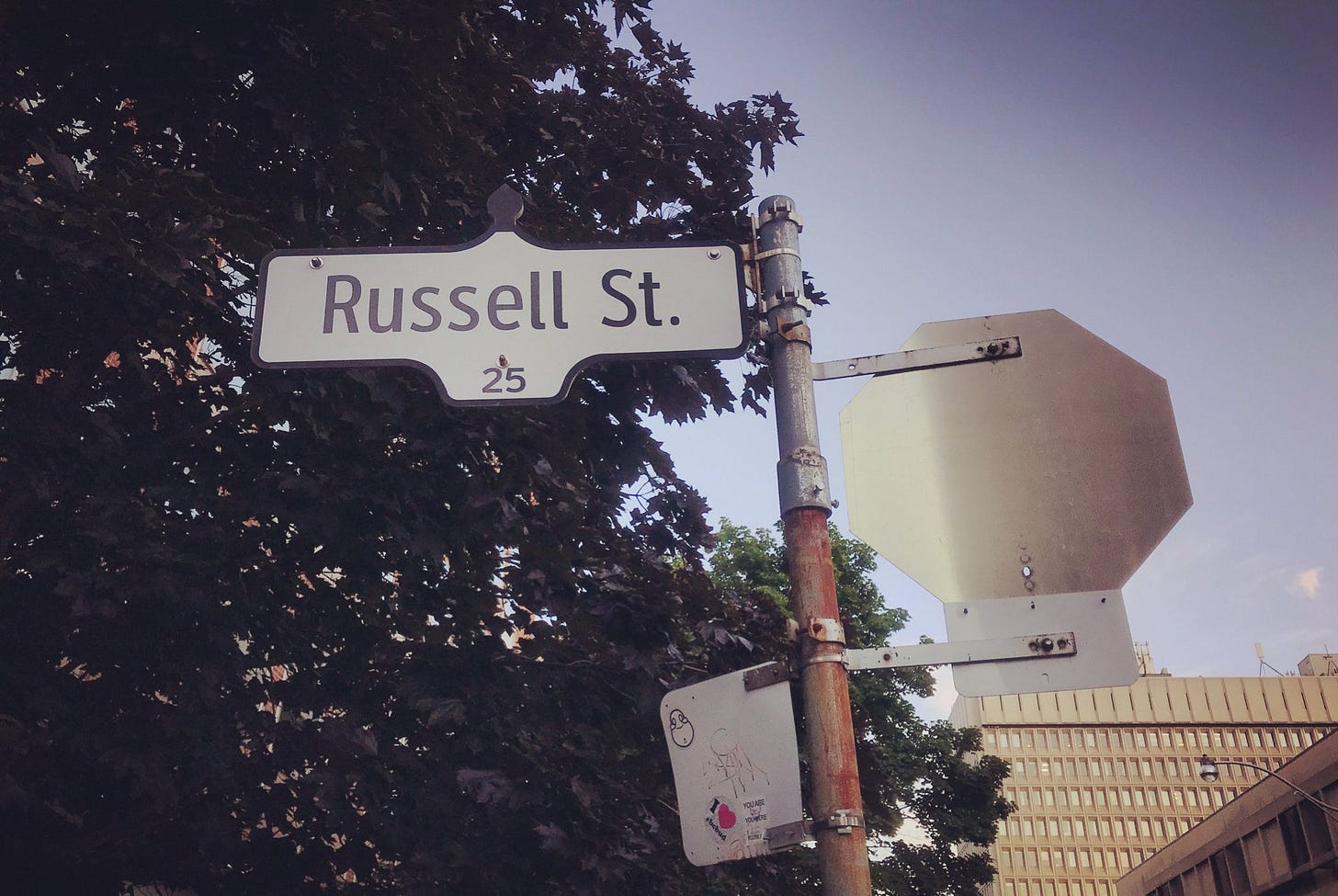The Musical That Changed Canadian Comedy
Plus the City wants to know what you think about renaming stuff, and lots more.
This week in 1972, a local production of a hit Broadway musical opened on King Street with a cast full of comedians, actors and musicians who would go on to become some of the biggest stars in Canadian history.
This week in 2022, we’ll talk about that musical. Plus, the City would like to know what you think of renaming streets and other public places, I’ll share the most fascinating links from this week’s Toronto heritage news, and more!
But first, a quick and friendly reminder that it takes a ton of work to write this newsletter every week, so the only way I’ll be able to keep doing it is if enough of you are willing to switch to a paid subscription. For a few dollars a month, you’ll be supporting all the work I do — and get some fun extras in return, too, like access to free online talks, discounts off my online courses, and more.
You can make the switch — or subscribe for free if you haven’t already — by clicking here:
Thanks to everyone who reads, subscribes and spreads the word!
THE MUSICAL THAT CHANGED CANADIAN COMEDY
DAY BY DAY NEWS — One of the landmark events in the comedic history of Canada began at the Royal Alexandra Theatre during this week in 1972, exactly fifty years ago. It was a local production of the hit Broadway musical Godspell. The cast was filled with promising young actors and musicians just getting started in their careers. But the performances they delivered on King Street that summer — and at the Bayview Playhouse in the months that followed — helped lead them down the road to stardom. Many of them would eventually become household names, taking their place among the most beloved Canadian talents of all-time.
The playbill reads like a list of stars on the Canadian Walk of Fame:
Eugene Levy. Martin Short. Andrea Martin. Gilda Radner. Dave Thomas. Paul Shaffer. Howard Shore. Victor Garber.
Not to mention the friends who weren’t in the show, but were part of that scene, like Catherine O’Hara and Dan Aykroyd.
The musical was slated to run for just six weeks. But it proved to be so popular it lasted sixty weeks instead, writing itself into the annals of comedy in the process. And this week, The Washington Post compiled an oral history of the Toronto production, with the stars reminiscing about the role it played in their lives during those seminal days half a century ago.
THE CITY WANTS YOUR THOUGHTS ON RENAMING STREETS ‘N’ STUFF
RENAMING NEWS — If you’re reading this on Sunday night (May 29) then you’ve got jussssst enough time to offer your opinion on how things in Toronto get named and renamed. Today is the final day of the “Recognition Review” survey.
The renaming of Dundas Street is the story that’s been making all the big headlines, but there’s actually a much bigger rethink going on. By the time that news was announced, the City had already identified another 60 street names that might be reviewed — and since places named after at least one slaveholding settler family (the Denisons) weren’t included on that list, it will presumably grow longer from there.
Some places, in fact, had already changed their names before the Dundas decision was made. Russell Street, for instance, was named after a local slaveholder, Peter Russell. So in 2020, it was renamed as Ursula Franklin Street, in honour of the badass Toronto scientist who used hundreds of thousands of human teeth to fight nuclear weapons. (A story I’ve told on Twitter.)


Now, in the wake of the decision to rename Dundas, the City of Toronto has launched a big review of “how the City honours history in public spaces …. developing a new framework to guide how it commemorates public figures and events in monuments, street and place names.”
The new framework is going to be presented to City Council in July. But before it is, they’re asking for your input. There’s an online survey they’d like you to fill out. And today’s the last day to do it.
QUICK LINKS
The best of everything else that’s new in Toronto’s past…
TORONTO WOMEN’S LIBERATION MOVEMENT NEWS — Organizer Judy Darcy look back at the history of the Toronto Women’s Liberation Movement in the early 1960s (a time when an official at Toronto General Hospital told her “three to four women a night would come into their emergency department after botched abortions”) and “The Abortion Caravan” that travelled across the country on its way to shutting down the House of Commons in Ottawa. Read more.
DEMOLISHING CHINATOWN NEWS — Kathryn Mannie shares the history of Chinatowns across Canada and the ways governments have tried to destroy them over the centuries, including the how Toronto’s Chinatown was levelled to make way for Nathan Phillips Square. Read more.
WANT TO SEE WHAT ELVIS’ TV SET LOOKED LIKE? NEWS — blogTO pays a visit to “the world's largest and most important museum dedicated to television,” which, it turns out, is in Liberty Village. Its collection of beautiful old sets includes TVs that belonged to Elvis Presley and Marilyn Monroe. Read more.
A TOUR OF KENSINGTON NEWS — Jamie Bradburn takes a stroll around Kensington Market, diving into some of its history for The Toronto Star. Read more.
UGLY ELECTION NEWS — …and over at TVO, he takes a look at another bitter provincial election campaign, featuring shouting matches, traffic jams, and the NDP forming the official opposition. Read more.
GHOST SIGN NEWS — Katherine Taylor finds another neat ghost sign. This time, from a Victorian camping store in the east end:




LIVING ON A WHARF NEWS — Jane MacNamara digs into the life of Samuel Wedge, an unemployed and elderly Torontonian who lived at Rees’s Wharf (at the foot of Simcoe Street) in the 1860s. Read more.
CHURCH CONDO NEWS — Urban Toronto checks in on the progress of a project at Bloor & Huron. A Victorian church, Bloor Street United, is getting partially demolished and partially preserved as a condo tower and a new head office for the United Church of Canada are built. Read more.
TORONTO HISTORY EVENTS
DEATH OR CANADA: THE IRISH FAMINE MIGRATION TO TORONTO, 1847
May 31 — 6:30pm — Online — Enoch Turner Schoolhouse Foundation
“This year marks the 175th anniversary of Irish Famine migration to Canada. Join author and historian, Professor Mark McGowan, as he shares his work Death or Canada: The Irish Famine Migration to Toronto, 1847. Discover the impact this historic event had on the city and hear stories of the men and women who made the perilous sea voyage to Canada.” The talk will follow the foundation’s annual general meeting.
Free with registration, I believe.
RECONCILIATION: IS IT WHAT YOU THOUGHT?
May 31 — 6:30pm — Online — Riverdale Historical Society
“An in depth look at inequality, mythology, discrimination and action. The importance of history and learning while working toward reconciliation with tie-ins to work that the First Nations Child and Family Caring Society has done to highlight Dr. [Peter] Bryce’s legacy, as 2022 will be the 100th anniversary of the publication of ‘A National Crime’” his whistle-blowing report on the residential school system.
With Cindy Blackstock, a member of the Gitxsan First Nation, Executive Director of the First Nations Child and Family Caring Society, and a professor at McGill University’s School of Social Work.
Free, I believe, if you join the Riverdale Historical Society’s mailing list.
1851: SPIRIT & VOICE
June 8 — 7pm — Online — Myseum
“Back by popular demand! Welcome to 1851: Spirit & Voice, a theatrical and playful revisiting of the 1851 North American Convention of Coloured Freemen. Through this new work written by playwright Luke Reece, step into the world of a fictionalized digital conference where the past and present collide.
“Live from St. Lawrence Hall, Marie and Anthony host a retrospective look at the gathering of 19th century abolitionists in Toronto, when their event is crashed by ghosts of conventions past. Together our characters grapple with the way history has been written, as well as issues that affect Black lives today. Watch leading historical figures Mary Ann Shadd Cary, Henry and Mary Bibb, and Frederick Douglass share their unfiltered thoughts on historical storytelling and 21st century anti-Black racism.”
Free with registration.
ERNEST D. BANTING’S LIFE IN WESTON
June 16 — 7:30pm — Online — Etobicoke Historical Society
“Ernest D. ‘Doc’ Banting (1892-1973), a distant cousin to Dr. Frederick Banting, discoverer of Insulin, was a leading citizen of the Town of Weston in the mid-1900’s. As a salesman and politician in a career that spanned more than five decades from the 1920s to the 1970s, ‘Doc’ was a shameless self-promoter but a constant home-town booster … and a bit of a rogue.
“Join EHS Historian Richard Jordan as he follows ‘Doc’ around the town while exploring topics like small town sports, municipal politics, the Orange Order, the effects of the Depression, the birth of Canada’s unemployment system, the role of service clubs like the Lions and, last but not least, temperance. Vividly recreating a community from a vanished era, Richard will draw on research from his newly-published book, Ernest D. Banting and Life in Weston 1921-1973.”
Free for members; an annual membership is $25.






